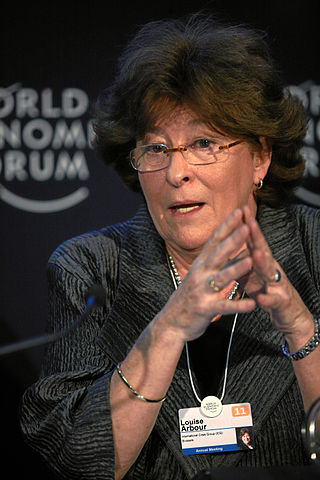
Human rights are moral principles, or norms, for certain standards of human behaviour and are regularly protected as substantive rights in substantive law, municipal and international law. They are commonly understood as inalienable, fundamental rights "to which a person is inherently entitled simply because she or he is a human being" and which are "inherent in all human beings", regardless of their age, ethnic origin, location, language, religion, ethnicity, or any other status. They are applicable everywhere and at every time in the sense of being universal, and they are egalitarian in the sense of being the same for everyone. They are regarded as requiring empathy and the rule of law, and imposing an obligation on persons to respect the human rights of others; it is generally considered that they should not be taken away except as a result of due process based on specific circumstances.

The Universal Declaration of Human Rights (UDHR) is an international document adopted by the United Nations General Assembly that enshrines the rights and freedoms of all human beings. Drafted by a UN committee chaired by Eleanor Roosevelt, it was accepted by the General Assembly as Resolution 217 during its third session on 10 December 1948 at the Palais de Chaillot in Paris, France. Of the 58 members of the United Nations at the time, 48 voted in favour, none against, eight abstained, and two did not vote.
The Palestinian Society for the Protection of Human Rights and the Environment was "dedicated to preserving human rights through legal advocacy". Also known as LAW, this legal society is an affiliate to the International Commission of Jurists (ICJ), The World Organization Against Torture (OMCT) and the International Federation of Human Rights Leagues (FIDH) and is a member of the Euro-Mediterranean Human Rights Network.
In law, a legal person is any person or 'thing' that can do the things a human person is usually able to do in law – such as enter into contracts, sue and be sued, own property, and so on. The reason for the term "legal person" is that some legal persons are not people: companies and corporations are "persons" legally speaking, but they are not people in a literal sense.

The European Law Students' Association (ELSA) is an international, independent, non-political, non-profit, non-governmental organisation run by and for law students. ELSA-activities comprise a large variety of academic and professional events that are organised to fulfill the stated vision of ELSA.
Economic, social and cultural rights (ESCR) are socio-economic human rights, such as the right to education, right to housing, right to an adequate standard of living, right to health, victims' rights and the right to science and culture. Economic, social and cultural rights are recognised and protected in international and regional human rights instruments. Member states have a legal obligation to respect, protect and fulfil economic, social and cultural rights and are expected to take "progressive action" towards their fulfilment.
Reprieve is a nonprofit organization of international lawyers and investigators whose stated goal is to "fight for the victims of extreme human rights abuses with legal action and public education". Their main focus is on the death penalty, indefinite detention without trial, extraordinary rendition and extrajudicial killing. The founding Reprieve organization is in the UK, and there are also organizations in the United States, Australia and the Netherlands, with additional supporters and volunteers worldwide.

The Center for Constitutional Rights (CCR) is a progressive non-profit legal advocacy organization based in New York City, New York, in the United States. It was founded in 1966 by Arthur Kinoy, William Kunstler and others particularly to support activists in the implementation of civil rights legislation and to achieve social justice.

The Association for Civil Rights in Israel (ACRI) was created in 1972 as an independent, non-partisan not-for-profit organization with the mission of protecting human rights and civil rights in Israel and the territories under its control. ACRI is Israel's oldest and largest human rights organization. Headquartered in Tel Aviv, with offices in Jerusalem, and Nazareth, the organization promotes transparency and accountability in government.
The American Non-Governmental Organizations Coalition for the International Criminal Court (AMICC) leads the civil society movement for full United States participation in the International Criminal Court.
The Parwan Detention Facility is Afghanistan's main military prison. Situated next to the Bagram Air Base in the Parwan Province of Afghanistan, the prison was built by the U.S. during the George W. Bush administration. The Parwan Detention Facility, which housed foreign and local combatants, was maintained by the Afghan National Army.

All-Ukrainian Association of Public Organizations Ukrainian Helsinki Human Rights Union (UHHRU) was founded by 15 public human rights organizations on 1 April 2004. UHHRU is a non-profit and non-partisan organization.
Haji Rohullah is a citizen of Afghanistan held in the United States' Bagram Theater detention facility, in Afghanistan. Rohullah worked as a driver before being seized at his farm in Jalalabad in August 2006.
Indigenous rights are those rights that exist in recognition of the specific condition of the Indigenous peoples. This includes not only the most basic human rights of physical survival and integrity, but also the rights over their land, language, religion, and other elements of cultural heritage that are a part of their existence and identity as a people. This can be used as an expression for advocacy of social organizations, or form a part of the national law in establishing the relation between a government and the right of self-determination among its Indigenous people, or in international law as a protection against violation of Indigenous rights by actions of governments or groups of private interests.

Tina Monshipour Foster is an Iranian-American lawyer and director of the International Justice Network.
Media Defence is a non-governmental organization established in 2008 to provide legal assistance to journalists, citizen journalists and independent media institutions. It also supports training in media law and promotes the exchange of information, litigation tools and strategies for lawyers working on media freedom cases. It is based in London, England and has a global network of media lawyers and media freedom activists with whom it works on cases and projects.

The European Center for Constitutional and Human Rights (ECCHR) is an independent, nonprofit non-governmental organization with the aim of enforcing human rights through legal means. Using litigation, it tries to hold state and non-state actors responsible human rights violations. It was founded in 2007 by the German civil rights attorney Wolfgang Kaleck together with a group of human rights lawyers, in order to help protect the rights guaranteed by the Universal Declaration of Human Rights, as well as other declarations of human rights and national constitutions, by juridical means. ECCHR engages in litigation, using European, international, and national law to help protect human rights.

Women in law describes the role played by women in the legal profession and related occupations, which includes lawyers, paralegals, prosecutors, judges, legal scholars, law professors and law school deans.

Basic human rights in Italy includes freedom of belief and faith, the right of asylum from undemocratic countries, the right to work, and the right of dignity and equality before the law. Human rights are the basic rights of every citizen in every country. In Italy, human rights have developed over many years and Italy has education on human rights. In addition, Italy has specific human rights for women, children and LGBT people.